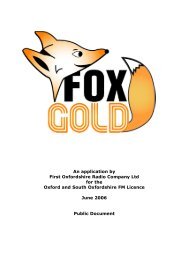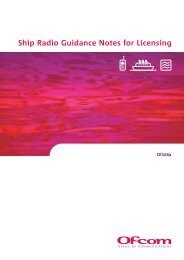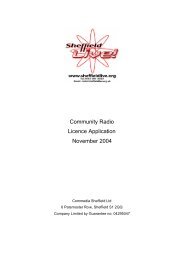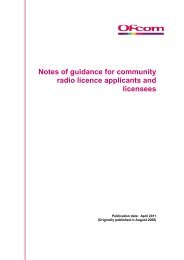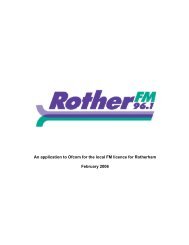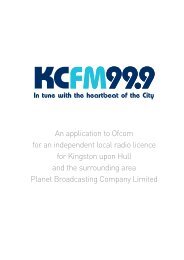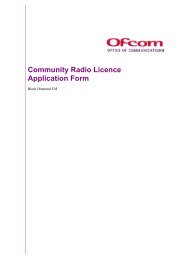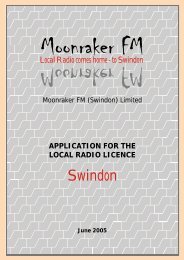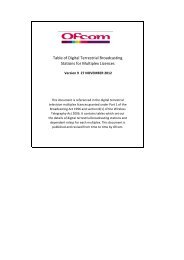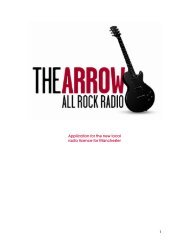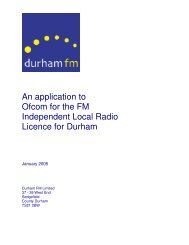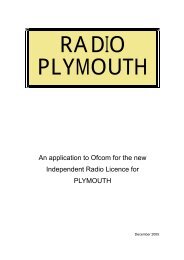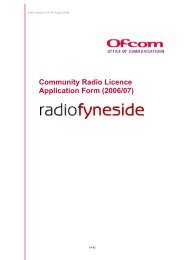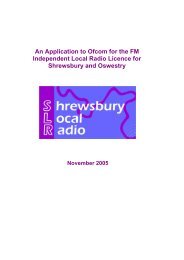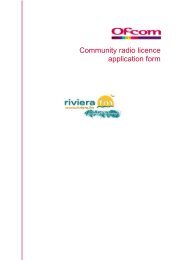Community radio licence application form TD1 ... - Ofcom Licensing
Community radio licence application form TD1 ... - Ofcom Licensing
Community radio licence application form TD1 ... - Ofcom Licensing
You also want an ePaper? Increase the reach of your titles
YUMPU automatically turns print PDFs into web optimized ePapers that Google loves.
<strong>TD1</strong> Radio <strong>application</strong> <strong>form</strong><br />
3<br />
propose be reflected on-air?<br />
What is the likely music to speech ratio?<br />
Will this vary at different times of the day or week (or year)?<br />
Do you intend to broadcast live output? If so when and how much do you propose to do?<br />
Will you broadcast in languages other than English (what languages and how much)?<br />
Will your output be original i.e. produced for your service alone?<br />
Will it be locally produced?<br />
Do you intend to repeat material?<br />
Answer in fewer than 1,000 words:<br />
The station will typically broadcast live, mainly locally produced programming for ten hours per day between the<br />
hours of 06:00 and 22:00. Live programming will typically comprise 80% music and 20% speech during daytime<br />
hours. The majority of our programmes will be produced exclusively by us, for us, with one of our programmes<br />
(The Sunday Getherin‟), being outsourced to Celtic Music Radio in Glasgow who asked if they could also<br />
broadcast this programme, albeit on a time shift (+2hr) delay.<br />
Some specialist programming (The Emancipation Show, broadcast on a Saturday at 22:00 hours, The Hot Disc<br />
Christian Top 20, broadcast on a Sunday at 08:00 hours and The Hot Disc Country Music Top 40, broadcast on a<br />
Sunday at 12:00 hours) are provided to us as well as other <strong>radio</strong> stations.<br />
Speech output will be in English/Scottish and will include community, local and national news, interviews, phone<br />
ins, discussions, as well as live and pre-recorded interviews. We will also provide a job spot (the area has<br />
suffered badly in recent years due to a decline in the textile and electronics industry) and ensure that we<br />
broadcast featured vacancies every day. This will give listeners the chance to hear about job opportunities that<br />
may suit them, while they listen to our normal live programming (something that previously existed on local BBC<br />
Radio many years ago, but has since disappeared).<br />
We do not anticipate that our music to speech ratio will vary much according to the time of year. We have<br />
planned features/programming to suit seasonal changes (e.g. activities that take place only during the Summer<br />
we would be unable to broadcast during the Winter, to this end we have ensured that sufficient Winter activities<br />
have been scheduled to replace Summer ones in our programme line-up, therefore ensuring an equal ratio of<br />
speech-based programming all year round. We plan to focus our speech based content around our morning<br />
programming (10am – 12pm), have some shorter features/interviews during our afternoon programming (1 –<br />
4pm) and have a 1 hour long magazine type programme broadcast every weekday between 5 and 6pm). This<br />
programme will feature more in-depth interviews and features as well as a round-up of local news stories, live<br />
studio guests, phone-in and pre-recorded interviews. During our live daytime hours we will also feature live news<br />
on the hour from IRN (Sky News Radio) with local news bulletins tagged onto the end of key listening hours (e.g.<br />
during breakfast, lunchtime and drive-time) thus ensuring that listeners get kept up-to-date with not just national<br />
and international news, but also local stories too.<br />
Local charities, non-profit making organisations and community groups will all be invited in to make their own<br />
programmes, as will schools and students from the local University campus. There is currently no media studies<br />
facility locally (the nearest being in Edinburgh) – community <strong>radio</strong> would allow students with an interest in<br />
pursuing a career in <strong>radio</strong> to get some experience by becoming involved in programme making and production as<br />
well as receiving training from experienced members of the team.<br />
Our music features new artists from the local music scene as well as genres such as Pop / Chart / Dance / Rock /<br />
Indie / Alternative / Celtic Rock / Folk / Traditional / Scottish Dance / Blues / Country / Christian / Jazz / Soul /<br />
World Music / Oldies / Classical / Club / as well as listener requests.<br />
It is not our intention to repeat material, with the exception of perhaps any specialist programming which has<br />
been pre-recorded to start with (e.g. The Emancipation Show) or one off “specials” which may warrant a second<br />
airing at a later date.<br />
B: Based on what you have said above, how will your proposed <strong>radio</strong> service cater for the tastes and<br />
interests of your target community/communities?<br />
Answer in fewer than 400 words:<br />
Since we launched in 2008, <strong>TD1</strong> Radio has conducted regular market research thus identifying the needs within<br />
our community. We have also made it our aim to actively seek out other local community groups and



